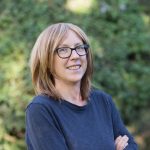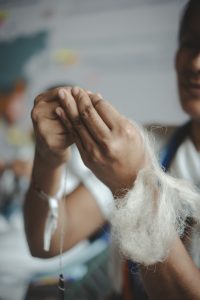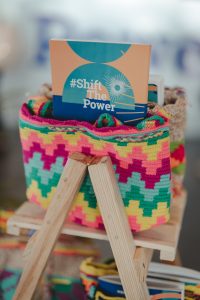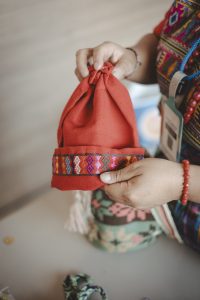People talk about building a movement – it’s already here
05 Jun 2024
Kate Moger joined Adeso in July 2023 as Global Director of the Pledge for Change. Prior to this, Kate spent over two decades working in humanitarian contexts, most recently as IRC’s Regional Vice President for the Great Lakes and Central Africa. (Kate recently completed a Diploma in Analytic Network Coaching and is keen to put the principles of Eco-Leadership into practice with the Pledge community.)
A new perspective: From INGO roles to Pledge for Change

Kate Moger, Pledge for Change
“I joined Adeso and started my role in the Pledge for Change in July 2023, having spent 20 years working in large international NGOs. It was exciting and baffling to discover that I’d spent 20 years in humanitarian and development contexts and had such little contact with civil society movements that make up the #ShiftThePower movement.”
“This part of the development ecosystem was very new to me – and my first reflection, both from the weaving conversations and attending the #ShiftThePower Global Summit – was what a vast array of wisdom, vision and ambition there is out there.”
Kate’s role “required someone who speaks NGO” and the part of the role that involves convening and coordinating with NGO leadership and staff felt familiar. “The piece I’m learning is how do we fit with civil society and the #ShiftThePower movement. The Summit was very helpful for that. It opened a huge number of doors to different movements and networks, and some are now seeking to co-opt the Pledge in support of their own advocacy objectives, which is exactly what they should be doing.”
International NGOS were in a very notable minority at the Summit, says Kate. “My sense from speaking to INGO colleagues is that they don’t see themselves as part of the #ShiftThePower movement. They see themselves as a target of advocacy, but they don’t see the movement as being their home. This is symptomatic of a broader malaise in the INGO sector – who too often don’t see themselves as part of civil society in the places in which they work. They don’t see the value or recognize their place in this part of the ecosystem. I think that’s a real problem.”
Kate was one of the panelists in one of the pre-Summit weaving conversations. “I was struck by how solidly the INGOs were the target of direct criticism, and that spoke to my ignorance of those perspectives. It was really helpful and instructive to hear that.”
Incentives are loaded against the shifting of power
Kate had conversations with INGO colleagues at the Summit where they agreed that that in many cases, organizations were stuck “in a place of rhetorical repositioning” and in many cases there was active internal and systemic resistance to change.
“The incentives in the system are loaded against the shifting of power. Leaders in many organizations, but INGOs in particular, are rewarded for growth. There’s an expectation of a trajectory that includes increasing the footprint, the ‘dosage’ and variety of interventions, and so on. But we haven’t figured out how to truly understand the impacts, both positive and negative, that stem from these different interventions. This is a big part that we have to undo.”
“It’s difficult to generalize about where INGOS are at in shifting the power – these organizations are all very different. But inside all of them, there are leaders, activists and champions who are absolutely working hard to change things. And there are also people who got the memo but are not necessarily following through with adapted practices.”
“I have heard some INGOs arguing that they are nurturing the emergent system – but they have a local partner they’ve been funding and working with for 30 years, and they’re not asking themselves the question: how is it possible this organization is still dependent on us? That’s the definition of failure.”
“What the Pledge for Change is trying to do is make space where INGOs – our signatories – can be challenged with perspectives from different places in the system, allowing partners to feedback on ways support might be done differently. With the Pledge accountability and learning mechanisms, we’re trying to flip some of logic around whose voice and opinions are important, and what success looks like.”
“To get more equitable dispersion of flexible funds or cost sharing or lots of things that are in the pledges, I think you need really courageous leadership, you need a different understanding of the kind of metrics of what success looks like.”
CSOs can drive the change we desperately need
“There’s this architecture in the global system that feels like it feels it is designed to keep power relations pretty much stuck where they are. But I do have a growing sense of optimism, despite all the terrible stuff that’s happening all over the world, that civil society movements are being galvanized and it’s all there.”
In a post-Summit blog post in January 2024, Kate wrote of her “epiphany” at the turn of the new year. “People often talk about building a movement. I’ve been pondering how to do that, as part of my role with the Pledge for Change.” Her realization was that “The movement doesn’t need building. It’s there, it’s active, and it’s growing. The energy, determination and innovation from across the eco-system – that is starting to knock on the door of Pledge for Change and offer ideas, energy, challenge and provocation – is extraordinary.”
“At the Summit, different movements came to us and said we need to get the INGOs, through the Pledge For Change, on board with our work and positioning.” Much of it was about protecting basic rights and the survival of civil society. “They wanted help resisting the existential threats that civil society faces. They want to get organized internationally on these issues.”
“For instance, the Latin American movements, who have just joined the Pledge, one of their asks is for us to connect them to African movement leaders so that they can learn from each other, and also explore how they better support each other.”
“To some extent, I feel more optimistic since starting this job than I used to be about civil society’s ability to imagine a different way of doing things, and to drive the change we desperately need. The fact you don’t see this imagination in other parts of the system is part of the problem.”
“At the Summit, I realized that there are movements – feminist movements, queer movements, indigenous movements – that are already occupying a new paradigm, a space much more informed by possibility and a kind of abundance narrative than the scarcity, conflict and competition that is the norm where I sit.”
“It was extraordinarily moving to see this in practice.” An example Kate recalls was of an indigenous women’s group who took on a multinational that had tried to appropriate a traditional weaving pattern. “They were so clear and embodied about their values and how they were going to do business and not conform to international norms or expectations. It was just remarkable.”
Read more in the series #RoadFromBogotá: Perspectives on how INGOs are faring as they work to #ShiftThePower and the accompanying series #RoadFromBogotá: Perspectives on how CSOs are faring as they work to #ShiftThePower




